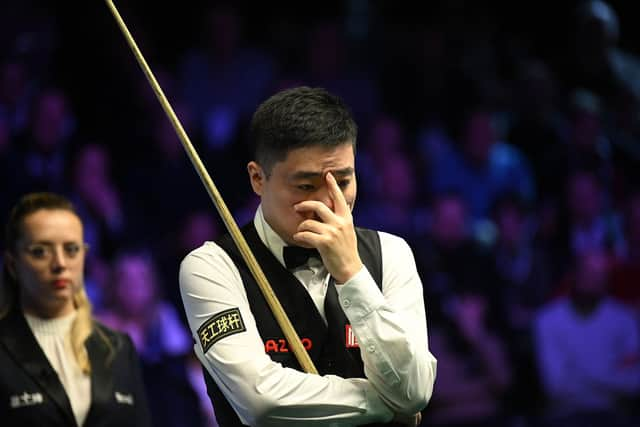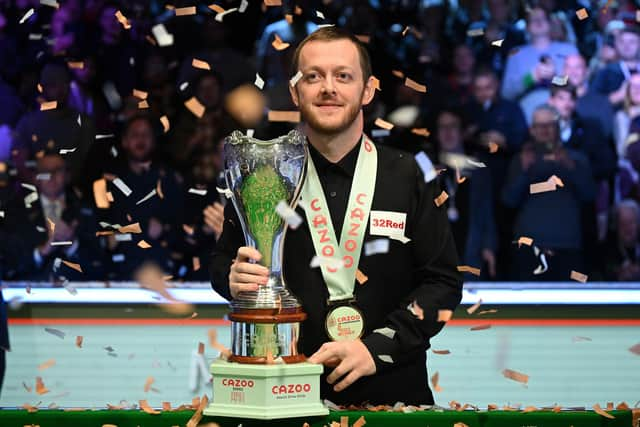World Snooker Championship returns to Sheffield with concerns about game's future direction
Sixteen years after his compatriot Ding Junhui became the first Chinese player to win the UK Championship, Yan’s success was seen to herald the arrival of an exciting new generation of talent that included another star in the making in the shape of Zhao Xintong.
Eleven months later, Zhao would make good on that promise when he swept to victory in the UK Championship, further enhancing the possibilities for snooker to plunder the riches of the east as it gradually emerged into a bright and hopeful post-Covid climate.
Advertisement
Hide AdAdvertisement
Hide AdThat optimism, however, would prove spectacularly misplaced. Tougher Covid protocols would shut snooker out of the lucrative Chinese market, and Yan and Zhao would become two of 10 Chinese players suspended and charged with a range of offences related to match-fixing.


Coupled with an unseemly war of words between world number one and defending champion Ronnie O’Sullivan and World Snooker Tour chief Steve Dawson, it means this year’s World Championship, which begins at the Crucible Theatre in Sheffield on Saturday, will do so under a storm cloud.
As if it is not enough for two of the game’s fastest-rising stars to be absent, the formal independent investigation into their alleged improprieties is set to coincide with the tournament’s second Monday, the same day the tournament’s quarter-final line-up is traditionally completed.
O’Sullivan, who could become the first player in the modern era to win eight world titles, has been typically restless throughout the campaign, and it ill behoves anyone to look at the formbook when it comes to considering whether the 47-year-old has a third title in four years within him.
Advertisement
Hide AdAdvertisement
Hide AdO’Sullivan has been scathing over the sport’s attempts to adapt to the loss of the lucrative Chinese revenue stream, claiming the sport is in a worse place than ever, and even suggesting players might consider going on strike.


It remains to be seen whether Dawson’s withering and potentially unwise response, in which he questioned O’Sullivan’s status as a role model and accused him of being disrespectful to a sport from which he has made a more than healthy living, prompts any reaction on or off the table.
Bare statistics appear to bear out some of O’Sullivan’s concerns. There remains a dearth of new talent – the leading domestic player aged under 30 is 30-ranked Joe O’Connor – and the list of likely contenders for the 2023 title is a familiar parade of faces.
There is a rising star from Yorkshire, 16-year-old Stan Moody who won the WSF Junior Championship this year to earn a card on the World Snooker Tour. He won one round of the World Championship qualifiers at the English Institute of Sport last week before losing in the second round.
Advertisement
Hide AdAdvertisement
Hide AdWhen the 32-strong tournament gets underway under the familiar ampitheatre of the Crucible, it takes a special type of player to adapt to the unique rigours and that is why the contenders for O’Sullivan’s crown are largely made up of players who have previously lifted the prestigious trophy.


Four-time winner Mark Selby recently won the WST Classic, firing three centuries in his final win over China’s Pang Junxu – and having eloquently confronted mental health concerns the Leicester 39-year-old appears settled and equipped for another challenge deep into the final week.
Shaun Murphy arrives at the Crucible on the back of one of his best seasons since he won his last world title as a qualifier in 2005, having won the Duelbits Tour Championship in Hull 10 days ago.
And it is also hard to look far beyond the experience of other previous winners including Judd Trump, Mark Williams and John Higgins.
Advertisement
Hide AdAdvertisement
Hide AdOne top player overdue a run at the Crucible is Northern Ireland’s Mark Allen, undoubtedly the season’s star performer with three tour titles to his name, but who has spectacularly under-achieved at the venue, failing to get past round two in all but one of his last 11 attempts.
Former semi-finalist Gary Wilson is a proven performer over the longer format, while Robert Milkins is in the form of his life.
Ding, meanwhile, has wrestled his way back into the top 16 on the back of his run to the UK final in York in May, and the vast experience of the now 35-year old makes him a name that none of the previously mentioned contenders would wish to see in their section of the draw.
It would be ironic – and entirely plausible – if Ding, the 2016 finalist and surely now in the bracket of one of the best players never to win the world crown, finally came good after a year in which the sport’s hopes of further eastern expansion had seemingly turned to dust.